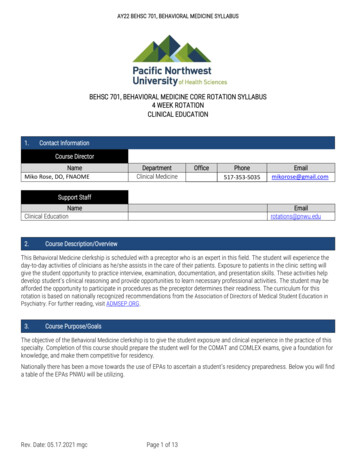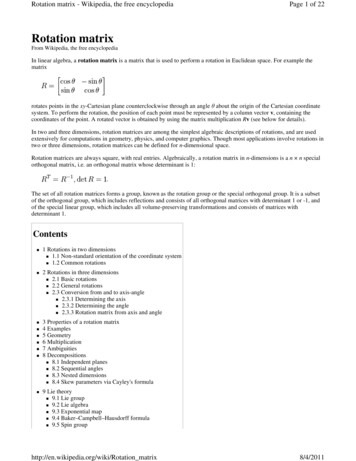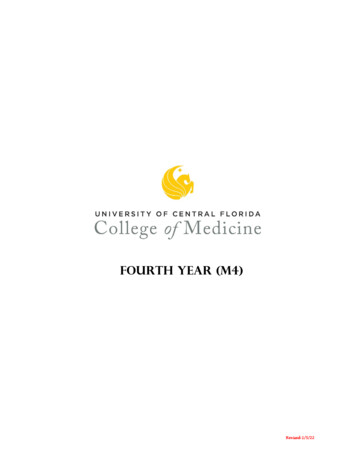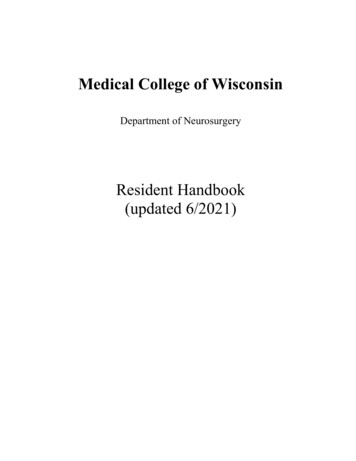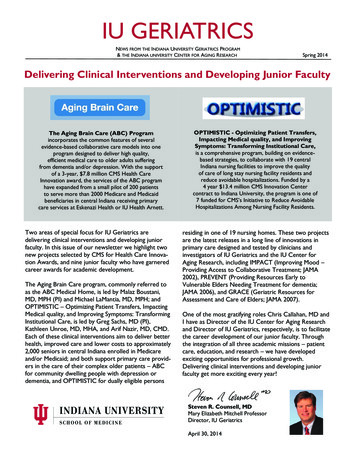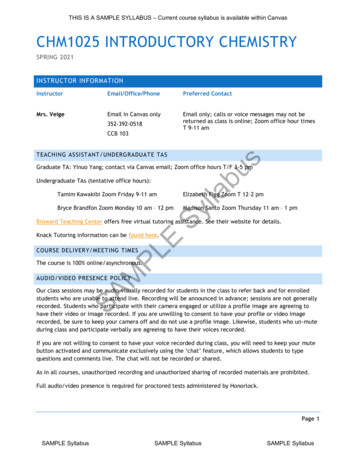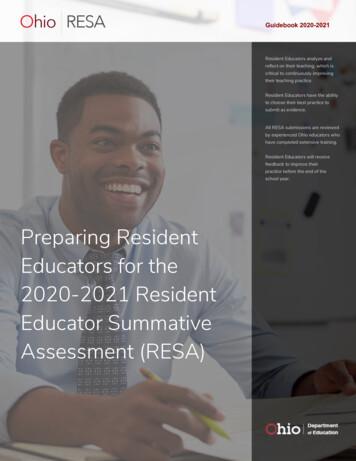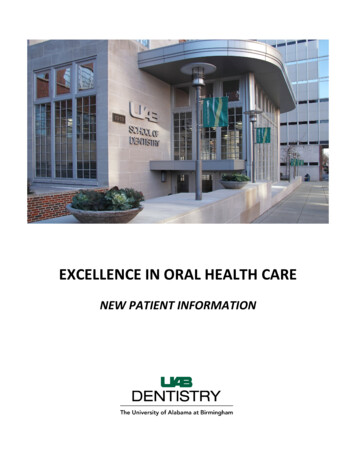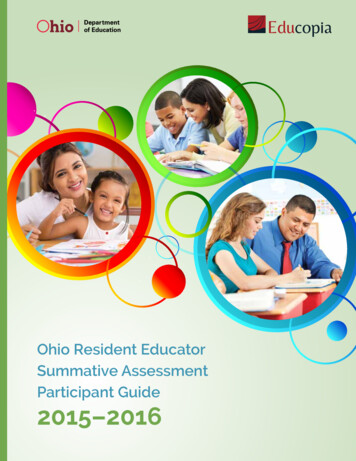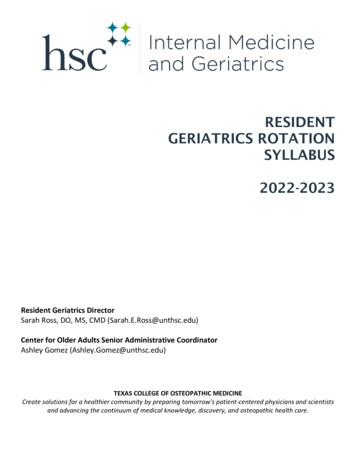
Transcription
RESIDENTGERIATRICS ROTATIONSYLLABUS2022-2023Resident Geriatrics DirectorSarah Ross, DO, MS, CMD (Sarah.E.Ross@unthsc.edu)Center for Older Adults Senior Administrative CoordinatorAshley Gomez (Ashley.Gomez@unthsc.edu)TEXAS COLLEGE OF OSTEOPATHIC MEDICINECreate solutions for a healthier community by preparing tomorrow's patient-centered physicians and scientistsand advancing the continuum of medical knowledge, discovery, and osteopathic health care.
ContentsPurpose and Description.2Competencies and Objectives.3-4Didactics and Reading .5Evaluation and Grading.6Faculty and Staff.7.8-9Attendance and Availability .8Professionalism and Ethics.9Problem Patients.9Equipment.9Rotation Sites and Site-Specific Guidelines .General Guidelines and Responsibilities.10-111
Purpose and DescriptionPURPOSEThe geriatric rotation affiliated with the University of North Texas Health Science Center/Texas College ofOsteopathic Medicine serves to provide supervised, high-quality opportunities for PGY1 Transitional andPGY2/3 Internal Medicine and Family Medicine Residents to apply and transform the medical knowledge andbasic clinical skills that they have acquired into clinical competence in the care of older adults whilefunctioning as learning members of interprofessional health care teams.The geriatric rotation promotes and supports residents in developing clinical competence with emphasis oncore competencies beyond medical knowledge. All participants are encouraged to seek opportunities toprovide Health and Wellness Counseling, develop improved interpersonal and communication skills,professionalism, as well as practice-based learning and progressive improvement.DESCRIPTIONThe population of adults 65 years of age will continue to increase into the 21st Century. All physicians will beexpected to be knowledgeable in geriatric care. The goal of this geriatric curriculum is to provide a foundationfor competent and compassionate care of older patients. This includes attitudes, knowledge, and skillsrequired to care for older adults. Education will occur in the ambulatory setting, nursing home setting, andthrough didactic activities.During the 4-week rotation, trainees will be exposed to a variety of geriatric care experiences includingambulatory practice, home visits, geriatric psychiatry, geriatric neurology, and skilled facility/rehab care.Knowledge will be gained through self-study, case reviews, clinical case discussions, working in ambulatorycare clinic, in-home care settings, skilled care, and participation in didactic opportunities. At the clinical sites,residents will examine their own attitudes toward aging, disability, and death; they are encouraged to provideempathy towards older adults and their caregivers and to appreciate the need for functional statusassessments of individual patients rather than focusing on diseases alone.2
Competencies and ObjectivesGERIATRIC COMPETENCY OBJECTIVESResidents must demonstrate competencies in these additional areas as required by the Accreditation Councilfor Graduate Medical Education (ACGME). (Reference: ACGME FM/IM Program Requirements for GME inGeriatric Medicine. 2014.)1. Patient Care and Procedural Skills Perform an efficient, focused outpatient visit with an older patient, including appropriate interview,taking of medical history, and physical examination. Ability to write concise, accurate, and informative history, physical examinations, and progress notes. Formulate a management plan. Clearly document patient management in the medical record. Appropriately prescribe medications in elderly patients. Lead discussions of both general management and end-of life issues with families.2. Medical Knowledge Recognize age-related changes in patient care. Understand the concept of wellness and appreciate the importance of maintenance of function inelderly patients. Testing for urgent and routine elder care. Familiarity with special features of diagnosis, interpretation of tests, and management of illnesses in ageriatric population. Manage patients in outpatient setting.3. Interpersonal Skills and Communication Communicate effectively and compassionately with elderly patients and their families. Recognize and deal effectively with the communication challenges resulting from cognitive impairmentin elderly patients. Effectively communicate elderly patient’s need to other providers, i.e., in transitions of care. Facilitate the functioning of the multidisciplinary team.4. Professionalism Interact professionally towards patients, families, colleagues, and all members of the health care team. Develop an appreciation of the social context of illness in the geriatric population. Maintain patient confidentiality and HIPAA guidelines.5. Practice Based Learning and Improvement Identify deficiencies in knowledge base and develop independent means to address them. Develop evidence-strategies for filling gaps in personal knowledge and skills in the care of elderlypatients. Facilitate the learning of other health care team members.6. Systems-Based Practice Mobilize resources to optimize elder health care delivery. Work as an equal member of a multidisciplinary team.3
Collaborate with other members of the health care team to assure comprehensive care for elderlypatients.Use evidence-based, cost-conscious strategies in the care of elderly patients.CORE ENTRUSTABLE PROFESSIONAL ACTIVITIES (EPAs)The curriculum is based on the Geriatric Entrustable Professional Activities (EPAs) to include essential tasksthat geriatricians can be trusted to perform effectively and safely in all care settings and with different olderadult populations. Experiences and encounters throughout the rotation provide residents opportunities topractice these activities.By the end of their rotation, interns and residents must be able to provide patient care that is compassionate,appropriate, and effective for the treatment of health problems and the promotion of health for older adults.Geriatric Entrustable Professional Activities – see RM Leipzig, 2014. What Is a Geriatrician? AmericanGeriatrics Society and Association of Directors of Geriatric Academic Programs End-of-Training EntrustableProfessional Activities for Geriatric Medicine. Journal of the American Geriatrics Society, 62:924–929.4
Didactics and ReadingDIDACTICSResidents are to complete all available online learning modules during any down time/study time during theirrotation:1. Online Learning Modules found unthsc.edu/GeriCE. Create an account to access the content.2. Telehealth 101 for Health Professionals & Trainees. To access, go to the resident rotation residents), and scroll to Didactic Activities.3. Available to attend as your schedule permits: Geriatric ECHO Sessions. These Zoom sessions occur atdifferent times throughout the year, usually from 12:00-1:00 pm. Please go tohttps://www.unthsc.edu/ECHO for more information and to register.RECOMMENDED READING Toolso Geriatrics at Your Fingertips. American Geriatrics Society. Updated Annually. Available as a Freeapplication for IPhones and Smart Phones. Search for “Geriatrics at Your Fingertips”o Story P., C.F. Knight, R.S. Schonwetter. Pocket Guide to Hospice/Palliative Medicine. AmericanAcademy of Hospice and Palliative Medicine. ISBN: 1-889296-35-X. http://www.aahpm.org/o Choosing wisely: www.choosingwisely.org, Cassel CK Guest JA Choosing wisely: helping physicians andpatients make smart decisions about their care. JAMA 307 (2012): 1801-2.o Kobylarz, F.A., J.M. Heath, R.C. Like. “The ETHNIC(S) Mnemonic: A Clinical Tool for EthnogeriatricEducation.” JAGS 50.9 (2002); 1582-9. Administrativeo Making Home Care Work in Your Practice: A Brief Guide to Reimbursement and Regulations. AmericanAcademy of Home Care Physicians. Jan. 2004.o McCann, R. “Lack of Evidence about Tube Feeding—Food for Thought.” JAMA 282.14 (1999):1380-81o Dunn, Hank. Hard Choices for Loving People: CPR, Artificial Feeding, Comfort Care and the Patient witha Life-Threatening Illness, Fifth Edition. Lansdowne, VA: A & A Publishers, Inc., 2009 Othero Unwin B.K., A.F. Jerant. “The Home Visit.” American Family Physician. 60.5 (1999): 1481-8.o U.S. Preventive Services Task Force Recommendations. United States Preventive Task /recommendations.htmo Association of American Medical Colleges / John A. Hartford Foundation, Inc. July 2007 ConsensusConference on Competencies in Geriatrics Education. Academic Medicine. 84(5):604-10, May 2009.5
Evaluation and GradingEvaluations are completed in New Innovations by the faculty with whom you are working. Please refer to theCompetencies and Objective section on pages 2-4 to review how you will be evaluated.6
Faculty and StaffKEY PERSONNEL: Janice A. Knebl, DO, MBAInterim Chief Medical Officer, HSC Health Clinical PracticeInterim Chair, Dept of Internal Medicine and GeriatricsChief, Center for GeriatricsRegents Professor, UNT SystemDSWOP Endowed Chair and Tenured Professor in Clinical GeriatricsJanice.Knebl@unthsc.edu Sarah Ross, DO, MS, CMDAssistant Chief, Center for GeriatricsMedical Director, HSC Health Center for Older AdultsCourse Director, Geriatrics ElectiveAssociate Professor of MedicineSarahE.Ross@unthsc.eduOTHER GERIATRICS FACULTY: Adenike Atanda, PharmD, Assistant Professor, Adenike.Atanda@unthsc.edu Kathlene Camp, PT, DPT, Assistant Professor, Kathlene.Camp@unthsc.edu Emily Clark, LCSW, LCDC, Instructor, Emily.Clark-Nimz@unthsc.edu Sandra Davis, MD, Assistant Professor, Sandra.Davis@unthsc.edu Tyson Garfield, DO, Assistant Professor, Tyson.Garield@unthsc.edu Lesca Hadley, MD, Associate Professor, Lesca.Hadley@unthsc.edu Barbara L. Harty, RN, GNP, Assistant Professor, Barbara.Harty@unthsc.edu Brittany Love, DO, Assistant Professor, Brittany.Love@unthsc.edu Susan Matthew, ANP, GNP-BC, Instructor, Susan.Matthew@unthsc.edu J. David Orr, DO, Associate Professor, John.Orr@unthsc.edu Sherry A. Reese, RN, FNP, Instructor, Sherry.Reese@unthsc.edu Bincy Samuel, APRN, Instructor, Bincy.Samuel@unthsc.edu Kate Taylor, DNP, Assistant Professor, Kate.Taylor@unthsc.edu Kristen Reuter, MSSW, LCSW, Instructor, Kristen.Reuter@unthsc.edu April Wiechmann, PhD, Associate Professor, April.Wiechmann@unthsc.edu7
General Guidelines and ResponsibilitiesClinical conditions and geriatric syndromes encountered during daily clinical activities with the facultywill direct a significant portion of the educational experience. Individual learning goals will be based onknowledge deficits identified during patient interactions and reading literature during free time toadvance knowledge.As with most clinical experiences, trainees will be responsible for the initial evaluation of patients byperforming a careful interview and physical examination, reviewing pertinent laboratory andradiological studies, and formulating a preliminary diagnosis and plan for further diagnostic study andtherapeutic intervention. In the ambulatory clinic, a more abbreviated, focused approach isappropriate with the depth of interview and examination directed by the attending physician prior topatient contact. The patient case will then be presented in concise fashion to the attending physician,relaying pertinent parameters, diagnostic assessment, differential diagnostic possibilities, andpathophysiologic justification for the diagnosis and proposed course of action.Discussions will follow, with clarification and reinforcement of important geriatrics concepts. Thisshould allow the individual learner to identify areas requiring further study in order to enhanceunderstanding of the problems or diseases under consideration.It is anticipated that there may be significant gaps in the geriatric content knowledge with limitedclinical experience in the specialty of geriatrics. The purpose of probing questions by the faculty is toidentify prior knowledge and direct the trainee to important areas of misunderstanding or new datathat should be acquired to enhance the learner’s conceptual knowledge of geriatric medicine.After patient assessment and discussion, it is the responsibility of the resident to carefully documenttheir findings and impressions in the progress notes. An initial assessment requires an in-depthprogress note. All written and/or electronic notes will be reviewed and cosigned by the on-servicefaculty.Frequent feedback will be provided, striving to help advance understanding as much as possible duringthe rotation. Any concerns, difficulties or problems should be discussed with the attending or thecourse director to find solutions that enhance the quality of learning and enjoyment of what thefaculty hopes is an enjoyable as well as challenging experience.ATTENDANCE and AVAILABILITYThe Center for Older Adults expects 100% attendance at all required clinics, rounds, meetings, andassigned functions. Residents are required to adhere to the standard attendance policies described intheir respective performance handbooks.8
You are expected to be available during clinic hours. If for any reason you need to leave the clinic, youmust notify both the supervising attending physician and the geriatric rotation coordinator. Yourcontact phone number must be provided to the geriatric rotation coordinator.An absence of 5 or more days during any 4-week rotation for any reason will result in an INCOMPLETEgrade and remediating the rotation will be required. Faculty must be informed of any unanticipatedabsences.Any Paid Time Off (PTO) arranged prior to the rotation must be provided to the residency rotationcoordinator two weeks prior to rotation start date in order to complete scheduling.Failure to notify the rotation supervisor of any absence will be considered neglect of duty and mayimpact evaluation. If you are ill, or otherwise cannot be in the clinic, you must notify your preceptor atthe earliest possible time. You may also call the geriatric rotation coordinator.PROFESSIONALISM AND ETHICSThe trainee is expected to act professionally and adhere to medical ethical principles and respectpatient confidentiality. Appropriate badges identifying trainees as physicians should always be wornwhen seeing patients.The physician should appear well groomed, neatly dressed, and provide a professional image. Dressrequirements include a cleaned and pressed clinic jacket. We reserve the right to suggest that dressmay not be suitable, or we may suggest appropriate attire. The trainee’s response will be judged aspart of their self-management.The maintenance of the highest standard of professionalism and ethical behavior is always expected.This includes your relationship with the clinic staff, community agencies, and other medicalprofessionals.PROBLEM PATIENTSIf you are having trouble with a patient, please notify the supervising attending physician. He/she willadvise or assist you on handling the situation.EQUIPMENTDuring the rotation, all interns and residents are required to bring their stethoscope to the clinical site.If other medical equipment is needed, your attending will instruct you regarding what to bring.9
Rotation SitesASSISTED LIVING FACILITIESThe Ridglea4109 Westridge Ave, Fort Worth, TX 76116817-386-8351Auberge at Benbrook Lake7001 Bryant Irving Rd, Fort Worth, TX 76132817-292-2662CONTINUING CARE RETIREMENT FACILITIESThe Stayton2501 Museum Way, Fort Worth, TX 76107817-632-3654The Watermark at Broadway City View5301 Bryant Irvin Road, Fort Worth, TX 76132817-294-2280Trinity Terrace1600 Texas Street, Fort Worth, TX 76102817-338-2423MEMORY CARE LONG TERM CARE FACILITYJames L. West Dementia Center1111 Summit Avenue, Fort Worth, TX 76102817-877-1199UNTHSC CENTER FOR OLDER ADULTS – UNTHSC Health Pavilion(See next page for UNTHSC Center for Older Adults-specific processes)Center for Older Adults855 Montgomery Street, 4th Floor North, Fort Worth, TX 76107817-735-2200Geriatric Psychiatry and Neuropsychology855 Montgomery Street, 4th Floor South, Fort Worth, TX 76107817-735-2400HSC Health WellMed Clinic855 Montgomery Street, 4th Floor South, Fort Worth, TX 76107817-735-220010
UNTHSC CENTER FOR OLDER ADULTS SITE-SPECIFIC INFO1. New patient visit Arrive at the clinic 15 minutes prior to the start of clinic to follow the new patient. The resident is responsible for tracking the new patient from start to finish. New patient visits begin with a social service coordinator, then the patient is presented to theattending physician. The resident will start the history and physical including social, family, medications, and reviewof systems. The case will then be presented to the attending physician. Please task your completed note to your attending. This is how you sign your note.2. Established patient visit Visit with the patient and complete progress note. You may present the patient to the attending physician before or after the progress note iscompleted depending on time availability. Please task your completed note to your attending. This is how you sign your note.3. Roomed Patient When a patient is in a room and a black flag is exhibited, you may go in and examine the patient.After you are done, present the case to the attending physician and input the clinical data into theelectronic medical record (EMR).4. Progress notes Be sure to complete the EMR progress notes before leaving for the day.Please task your completed note to your attending. This is how you sign your note.EMR TIPS1. Review the NextGen Training video available online. To access, go to the resident rotation residents), and scroll to Syllabus and Orientation.2. Template-driven system; therefore, use the templates when possible.3. Verify correct doctor, date, patient, encounter, and clinic.4. Finish notes daily.5. Complete notes include HPI, ROS as necessary, PE, assessment, and plan.6. Annual Wellness Visits utilize a specific template.7. Medication review and update done each encounter.8. Utilize the “Preceptor” button at the bottom of the SOAP note on the adult office visit template asthis allows for your electronic signature to be affixed to the note and then sent to the attending forreview and sign off.11
RESIDENT . GERIATRICS ROTATION . SYLLABUS . 2022-2023 . Resident Geriatrics Director . Sarah Ross, DO, MS, CMD (Sarah.E.Ross@unthsc.edu) Center for Older Adults Senior Administrative Coordinator
